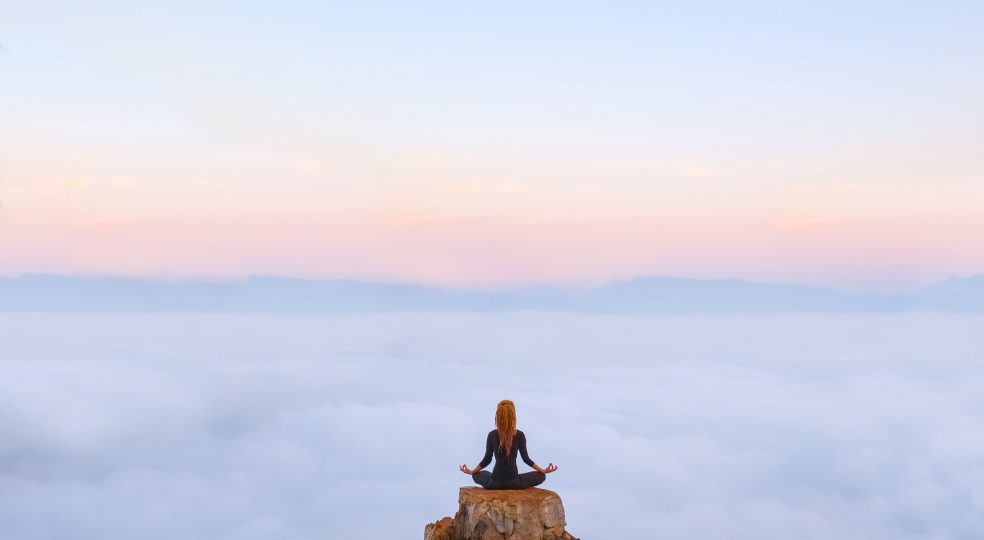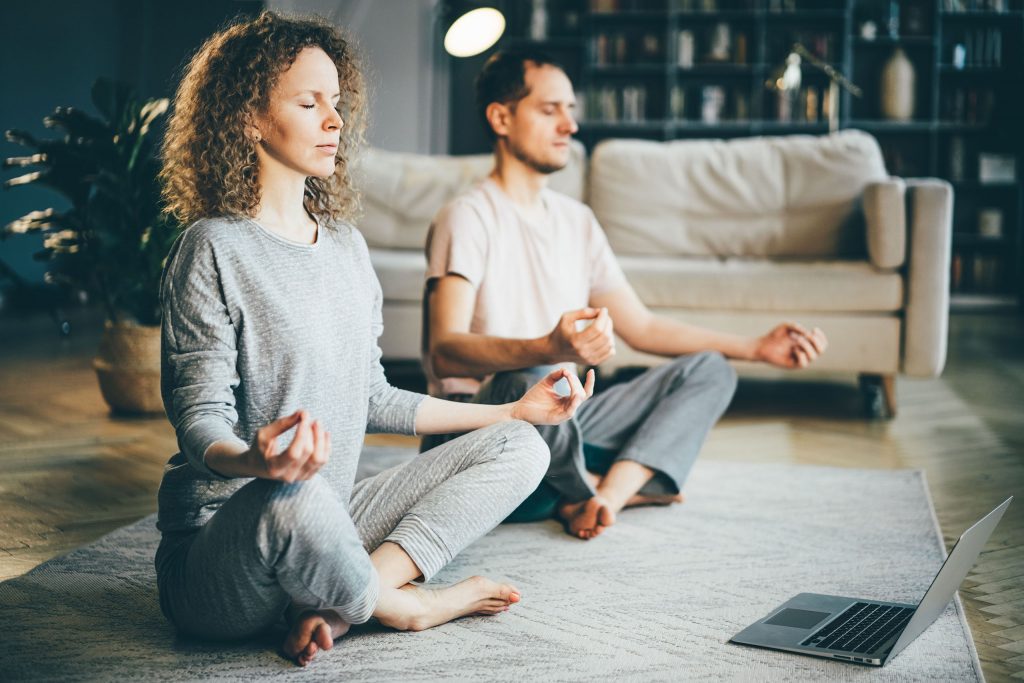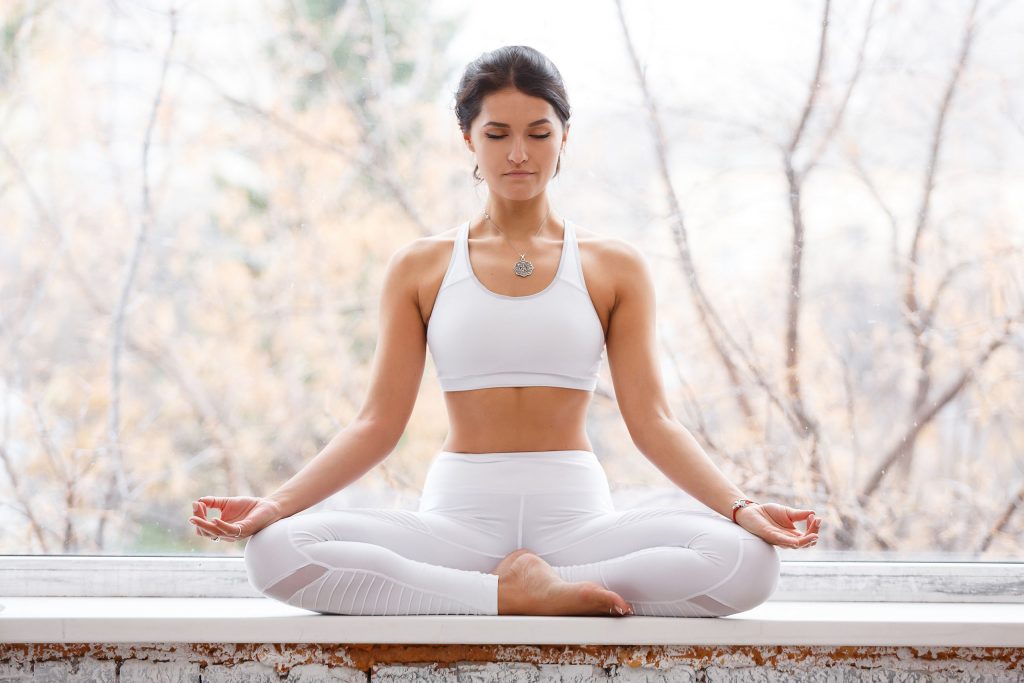
It's hectic in the office, your stress level is on level 3000 and you don't really have time to just switch off and relax? Your schedule is completely full and in your only free minute you have to go to the city hall or do your tax return? Phew. Who doesn't know them, the stressful phases, in which time slips away and you lose the feeling for yourself, somehow, between the hectic running from appointment to appointment. The solution: meditation!
Knowing full well that this stress can't actually be good. Because deep down, as you know, your mind deserves some time out. Meditations can help you to reflect on yourself. And you don't have to lock yourself up in your closet for two hours and light incense. Whether Mindfulness Meditation or Self-love Meditations -there are an incredible number of variations in meditation exercises.
Meditations have their origin in the Far East and are practiced there, especially in Buddhism. In the meantime, meditation is also becoming increasingly popular in the western world.
New books or seminars that address the topic are regularly published on the market. On the Internet you can find numerous articles, videos and podcasts on the subject. If you are looking for guided meditations we would like to recommend this video as a good starting point:
But what is the actual goal of meditation? What is meditation supposed to do and how can it help us to increase our quality of life?
The aim of a meditation is to bring the thoughts to rest. In this way, an inner balance is to be achieved, through which the body and mind can relax.
Meditation therefore has a decelerating and calming effect. Especially in our fast-paced world, meditation is a good method to bring more peace into everyday life.
Regular meditation helps, for example, against stress, inner restlessness, general malaise and in some cases even in the alleviation of depression.
Of course, not all meditation is the same. In the following we would like to introduce you to different types of meditation, so that you get a good overview for the beginning.
At this point we would like to introduce you to 7 types of meditation. Each of the techniques follows a different approach and is basically designed for specific target groups. We are already very curious which of the meditation techniques you like best and which you can use optimally for yourself in everyday life.
This is the most well-known meditation technique in the Western world. Mindfulness meditation is primarily about observing your thoughts carefully.
This is to develop a better awareness of the inner processes that occupy one. The main advantage of this technique is that it is well suited for beginners.
The focus of spiritual meditation is often the search for the divine. The goal is thus to create a connection to a higher being or God.
Such meditations are practiced in many world religions. Among them, for example, Hinduism, Daoism or Christianity.
As the name suggests, focused meditation is about concentrating on a particular circumstance. In this way, the mind should relax and detach from unnecessary thoughts.
You can concentrate on your breath, on a gong, on the rasping of leaves, a pressure point in the body or the flame of a candle. Basically, numerous variations are possible here.
Mantra meditation is especially widespread in Hinduism and Buddhism. Here, a certain exclamation is used to purify the mind of the meditator.
The best known exclamation is a long drawn out "Om". A mantra can also be a phrase or a prayer that is repeated again and again during meditation.
Visualizing meditation is about remembering situations from the past that were associated with a positive feeling.
By reviving positive feelings, negative states of mind that limit one's quality of life should be suppressed.
Bodyscan meditation is about relaxing the body to relieve, for example, neck tension that hinders you in everyday life.
Bodyscan meditation in this context makes use of the techniques of the progressive muscle relaxation and is therefore particularly suitable for people who suffer from chronic physical pain.
When we hear the word meditation, we often think of an old man sitting cross-legged under a tree, breathing in and out slowly over and over again.
That is only one side of the coin. Meditation can also be done differently. Through movement. Popular forms here are, for example, the Qiqon or walking meditation.

You are still at the very beginning and would like to Learn meditation? No problem at all! In the following, we would like to present 10 tips that will help you learn more about meditation, especially in the beginning.
You don't need any special clothes to start mediation. Choose whatever you feel comfortable in. The main thing is comfortable. And if you already start the day with meditation in the morning, your pajamas are perfectly adequate.
Meditation? Wasn't that something about sitting cross-legged? I must be tying my feet in knots. That's not true. You get to choose a position that feels good to you and that you can hold for 15 minutes without pain. Most meditations take place in a sitting position. There are different variations of this: Lotus, tailor, and heel sitting are just three of them. You can vary - but how far you cross your feet is up to you. As soon as it becomes uncomfortable, change position. You can also meditate on a chair or use a cushion. Your back should be straight. Your posture is upright and your shoulders may slump slightly. Avoid unnecessary movements, even if it is sometimes difficult to sit still.
The most important thing about mediation is your attitude. Especially as a beginner it will probably not be so easy for you to let your mind wander. But that's not a bad thing if it doesn't work right away. The saying is true: practice makes perfect. So don't give up, because every meditation will bring you more peace. What this means for you is that you shouldn't fall into frustration after the first meditation - along the lines of, "It's not going to work anyway." Detach from your expectations.
It may well be that you keep falling into the whirlpool of thoughts and can't set your thoughts as background noise like you can with a radio. But that is completely ok. Be happy that you are going on a journey and notice with every further meditation how you can improve your find inner peace. Maybe some meditation music will help you. Look for quiet instrumental music. Some meditation music also contains so-called mantras. Try it out and see what you like best. Relaxation brings.
Routine is the be-all and end-all. One-time mediation can of course relieve you of stress, but the real effect of mediation comes from prolonged use. Just try it! Integrating five minutes into your daily routine every day should work, right? And that's why meditations in the morning are ideal. You set your alarm clock five minutes earlier and can start the day fresh and refreshed. And you haven't really "lost" anything, have you?
Meditation requires silence. For this reason, it is important to eliminate all sources of interference before you start. For example, you can turn your cell phone on silent, close the windows tightly...
and also turn off your apartment bell for a brief moment. It is immensely important that you maintain focus during your meditation.
If you are struggling with tension (for example in your back), it makes sense to loosen up a bit beforehand. Simple stretching exercises that loosen your muscles can help.
This way you will be able to focus even better on your meditation so that you can achieve even better results.
Especially beginners often find it difficult to get into a relaxed state. However, with the useful tools can be remedied. Particularly popular are especially a
comfortable meditation cushion or scented sticks, which provide a pleasant atmosphere.
When you start jogging, you don't run 20 kilometers in your first session, do you? It's the same with meditation. That is, it is not necessary that you meditate for an hour or more at the beginning. It is sufficient, for example, if you start with 10 minutes and slowly increase.
If you find it difficult to relax and concentrate at the beginning, it makes sense to find a fixed point on which you can concentrate. This can be, for example, a candle, a point on the wall or another point in the room.
It is important that you make meditation a regular routine in your daily life. You can do this by setting fixed times when you always meditate. This can be the case, for example, in the morning after getting up, so that you start the day relaxed. But it can also be in the evening, so that you fall asleep relaxed afterwards. You decide! The important thing is that you feel good at the end of the day.
You picked a nice spot? Then make yourself comfortable. Feel comfortable. When you're comfortable, breathe deeply and calmly. Feel your breath. Feel your lungs rise and fall. Let your thoughts flow. Don't listen to them. Your concentration is on your breath. You can close your eyes. Five minutes is tops to start. Feel what the meditation does to you and integrate it into your everyday life.
Here you'll find a great Meditation for beginnersthat will help you take the first step:
Especially in the beginning, you still make quite a few mistakes in meditation. That's okay, and it's all part of the process. To make the beginning easier for you, we have prepared 3 tips that you should follow in the beginning to make fewer mistakes.
Meditation takes time. Therefore, don't put yourself under pressure if you don't achieve the desired effect during the first meditations. Because meditation is basically like a mental muscle that you have to train before it gets bigger.
One thing first: It is not enough if you meditate every day one week and then not again the next weeks. The thing to remember here is that meditation needs to be part of your regular routine.
activities. For starters, it's perfectly fine if you meditate for at least 15 minutes every day. If you manage to meditate for 15 minutes every day, then you are already
right at the front of the pack.
Today a focus meditation. Tomorrow a walking meditation. Or rather a mantra meditation? In the beginning it is quite normal to try something out. After a few test attempts, however, one should be at a Meditation type remain to perfect them.

For you, starting a meditation means going on a journey into your inner self. Meditation can help you to detach from all the stress and your environment and to get more clarity. In a meditation, you can let your thoughts rustle in the background like a radio station. Concentrate completely on yourself.
And that is important. Because Multitasking is ubiquitous in today's world. Operate your cell phone and watch a TV show at the same time? Always available at any time? 24/7? Who does not hunger for Rest and Deceleration. Mediation doesn't just bring you peace of mind. Mediations can help you:
And the beauty is, meditating isn't hard, costs you nothing but time, and is easy to incorporate into your daily life.
To cut to the chase: Meditation can noticeably improve your quality of life, lower your stress levels, and help you live a balanced life.
First of all, you can meditate anywhere. There are no limits to your choice of place. As a beginner, however, a quiet place is advantageous. A place where it is quiet and you can concentrate on yourself. Without distractions and distracting background noise. Maybe it's your bedroom in the morning, the park bench, or even a quiet minute in the kitchen. You'll find a good place. Do you feel comfortable? Can you relax here? Great, then put your phone to the side and put it on silent. You're priority number one now.
Five minutes can already help you to counteract the stress. The routine is crucial. If you meditate for five minutes a day, every day, your life can change. Don't believe it? Then give it a try. After all, not so much can happen to you. Worst case scenario, you've spent five minutes with yourself. In this article, you'll learn how to get started with meditations.
You feel unsure and don't know how to start the whole thing yet? Your thoughts keep wandering? Then look around for guided meditations. During a guided meditation you are not left to yourself and your mind, but can meditate with guidance. On this page we even have 5 guided meditations prepared.
By the way! If you have been interested in the topic of meditation for a long time and would now like to finally start, then you can now download our free meditation challenge do.


